Constitutional Monarchy君主立宪制
名词解释

TermsConstitutional Monarchy君主立宪制Constitutional Monarchy is a form of government in which a monarch acts as head of state and the power of the monarch (the king or queen) is limited by a parliament, by law, or by custom. Most constitutional monarchies have a parliamentary system in which the monarch only exercises ceremonial duties, but a prime minister is head of government and exercises effective political power.MPsThe House of Commons is a democratically elected body consisting of about 650 members called Members of Parliament (MPs). Each member is elected by and represents an electoral district of Britain known as a constituency. MPs are only allowed to sit for the lifetime of the Parliament, that is, the length of time between General Elections when a new set of MPs is elected. MPs receive a salary and will be able to identify with the “typical” voter they represent.Tower BridgeTower Bridge, officially opened on 30 June 1894, is a combined bascule and suspension bridge in London which crosses the River Thames. It is close to the Tower of London, from which it takes its name, and has become a symbol of London. The bridge consists of two towers tied together at the upper level by means of two horizontal walkways, and the vertical component of the forces in the suspended sections and the vertical reactions of the two walkways are carried by the two strong towers. The present color of white and blue is for Queen Elizabeth II’s silver jubilee.Afternoon Cuppa (tea)下午茶Afternoon tea was 'invented' by Anna Maria, the wife of the 7th Duke of Bedford, who would get hungry before dinner and start drinking tea and having a bite to eat in the mid-afternoon in order to tide her over during the long gap between lunch (at 1 p.m.) and dinner (at 7 p.m.). It starts with a pot of tea served with sugar and milk and includes thin slices of bread and butter, muffins, or scones with jam; sometimes with little sandwiches with egg, cucumber, or tomato with a pudding.The Open UniversityThe Open University is founded in Britain in the 1960s for people who might not get the opportunity for higher education. It is a distance learning and research university where the students’ previous academic achievements are not taken into consideration for entry. It provides a wide range of short and long-term undergraduate and postgraduate programs to students of all ages in the world in varied learning places from on-campus to off-campus. Learning takes place through a variety of media from printed materials, books, audio/video cassettes, TV, radio to software and wet-site. It has become the academic institution in the United Kingdom by student number.a welfare stateA welfare state can be defined as “a state with a government which assumes responsibility for the well-being of its citizens throughout life, through a range ofinterventions in the market economy.” The welfare state will aim to offer its citizens a life with certain specified standards of living which it considers reasonable and possible for all, and protection against the unexpected hazards of life (such as losing a job, becoming sick, having an accident, and so on).the quality press大报The quality press, such as Telegraph, The Times, Guardian, Observer, carry more serious and in-depth articles of particular political and social importance. They also carry reviews and feature articles about high culture and will generally be read by a well-educated, middle class audience.the tabloids小报The tabloids are also called “the gutter press”, which are smaller format newspapers with color photos and catchy headlines. The Mirror, Sun, Mail, etc. belong to the type. This kind of newspapers deals in scandals and gossip, usually about famous people, whether in politics, sports or entertainment, and carry lots of crime, sports and sensational human interest stories. The stories are short, easy to read and often rely more on opinion than fact.the Highland gamesThe Highland games is a celebration of Scottish and Celtic culture which takes place every summer in the north of Scotland. At the heart of any Highland games are the heavy events, known as “tossing the caber”——enormous men wearing kilts try to throw tree trunks high into the air to show off their physical prowess and strength. On the other hand, the musical aspect of the Highland games refers to that beautiful girls dance gracefully on top of swords accompanied by the music of the bagpipes, drums and fiddle, in which the dancers try to outdo each other in terms of grace and technical achievements.pantomime儿童哑剧Pantomime is a special kind of Christmas show for children which is loved by people of all ages and which also allows the audience to join in. “Pantomime” was the name of the Roman actor who performed shows without speaking. A pantomime is always based on a well-known children’s story, and there are certain types of characters, such as a “principal boy”, a “dame” and a “horse” in the show and certain situations and events. A pantomime contains lots of songs, dances and comedy. Members of the audience have to shout a warning to one of the characters and argue with them.Hogmanay苏格兰新年除夕It refers to Scotland’s New Year’s Eve, the major winter celebration. One widely practiced custom is “first footing.” It is believed that in the early hours of January 1st the first person to cross the threshold of a household can bring luck and prosperity. To be a true luck-bringer, the First Foot should be vigorous, healthy, young, good-looking and preferably dark-haired. He should bring symbolic gifts of food or fuel or money, or even carry a bunch of evergreen as a promise of continuing life. In return, the luck-bringer must be entertained with food and wine hospitably.Boxing Day节礼节(12月26日)Boxing Day is a holiday of particularly British origin, which takes its name from the old custom of giving employees or tradesmen (such as milkmen) an annual present or “Christmas box” on that day. It is on the second day of Christmas Day. It is common to spend the day with family members or friends, exchange presents and have a family meal in celebration. It i s also a day when stores launch one of the year’s biggest sales periods.Madam Tussaud 杜莎夫人蜡像馆: Madam Tussaud's Waxwork Museum(Madam Tussaud's for short) is one of the most popular tourist destinations ,located on Marylebone Road in London .It was established by Madam Tussaud in 1835, and it is one of the highest level waxworks museums in the world. In Madam Tussaud's there are lots of different famous people's waxworks in it displaying waxworks of historical and royal figures, film stars, sports stars and infamous murderers. Not only in London but also in Amsterdam, New York, Las Vegas, Hong Kong and Shanghai.What’s welfare?It means health, happiness/comfort and freedom from want. A safety net to offer help to the vulnerable(脆弱人群)What’s a welfare nation/state?Key: a state with a government which assumes responsibility of the well-being of its citizens throughout life, through a range of interventions in the market economy.福利国家指其政府在整个市场经济过程中,对国民终生承担健康责任的国家The British welfare system has nearly covered every aspect of all people living in the UK, this welfare system offer various kinds of welfare services and the British live a relatively relaxed and happy life.Aim to offer its citizensa life with certain specified standards of living which it considers reasonable and possible for all Protection against the unexpected hazards of life (losing a job, sick ,having an accident ,etc.) Provides education, housing, food ,health care, pension , unemployment , insurance, sick leave or time off due to injury, etc.Features of British Educational systemLong history 历史悠久Perfect rules ,laws ®ulations法律完善Perfect management system完美管理Efficient ,excellent 优良有效Scientific科学In good order有序Sufficient funds资金充足Open education system 公开Compatibility of Interchange相容立交Advantages of the British Educational SystemHigh quality \Formal language-widely used \Well-known\Short\Best environment\Parents accompanying students\Free medical service\Over 6months )part-time jobs(20 hours)\In holiday full time \transport , convenient,More single than married \Divorce’s reasons \Cohabite without marriages ¼in 2000 \Job first, raising babies until late 30s.\ single –parent familyGirls : financially independent, working, Choose her own husband, no dowry (嫁妆),It marks the beginning of a new and independent family.The new couples become the masters of themselves.In the past 20 years : nuclear family : father working , mother at homeNow : divorce: 1/3 marriages in divorce Mother: work and family Crimes increasing Children : independent and mature。
英国和君主立宪制Britain_and_Constitutional_Monarchy

Importance
• Magna Carta was the first document forced onto an English King by his subjects in an attempt to limit his powers by law. • Magna Carta was the most significant early influence on the extensive historical process that led to the rule of consititutional law today. Magna Carta influenced the development of the common law and many constitutional documents, such as the United States Constitution.
• 在1688年的光荣革命中,国会废除了不听话的詹 姆士二世,迎来了詹姆士二世的女婿、荷兰执政、 奥伦治亲王威廉三世。威廉自然要召集国会,而国 会在尊奉威廉为王的同时发布了权利宣言( declaration of rights),并在这一宣言的基础上 制定了《权利法案》(the bill制(limited monarchy):等级君主制是王 权借助等级代表会议实施统治的一种政权形式,贵 族和市民阶层共同参政,并在一定程度上分享权力。 • 等级君主制相对于中世纪早期的政治混乱和割据状 态而言,具有历史进步意义,推动了社会经济的进 一步发展。1265年召开的英国议会和1302年举行 的法国三级会议,标志着英、法两国等级君主制的 初步形成。
The Monarchy(三类君主制)
• 君主专制制(absolute monarchy):实行君主独裁 的政体形式;君主拥有无限的权力,他的意志就是 国家的法律,臣民必须绝对服从。 • 代表人物:法国君主路易十四;中国历史上的皇帝
【精选】英国君主立宪制
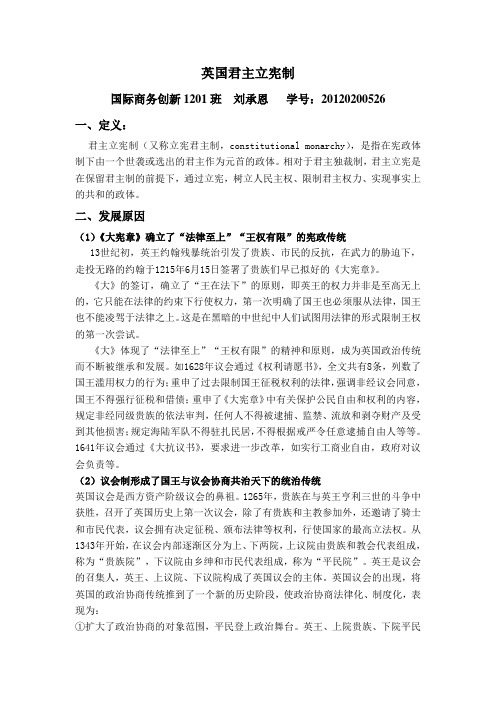
英国君主立宪制国际商务创新1201班刘承恩学号:20120200526一、定义:君主立宪制(又称立宪君主制,constitutional monarchy),是指在宪政体制下由一个世袭或选出的君主作为元首的政体。
相对于君主独裁制,君主立宪是在保留君主制的前提下,通过立宪,树立人民主权、限制君主权力、实现事实上的共和的政体。
二、发展原因(1)《大宪章》确立了“法律至上”“王权有限”的宪政传统13世纪初,英王约翰残暴统治引发了贵族、市民的反抗,在武力的胁迫下,走投无路的约翰于1215年6月15日签署了贵族们早已拟好的《大宪章》。
《大》的签订,确立了“王在法下”的原则,即英王的权力并非是至高无上的,它只能在法律的约束下行使权力,第一次明确了国王也必须服从法律,国王也不能凌驾于法律之上。
这是在黑暗的中世纪中人们试图用法律的形式限制王权的第一次尝试。
《大》体现了“法律至上”“王权有限”的精神和原则,成为英国政治传统而不断被继承和发展。
如1628年议会通过《权利请愿书》,全文共有8条,列数了国王滥用权力的行为;重申了过去限制国王征税权利的法律,强调非经议会同意,国王不得强行征税和借债;重申了《大宪章》中有关保护公民自由和权利的内容,规定非经同级贵族的依法审判,任何人不得被逮捕、监禁、流放和剥夺财产及受到其他损害;规定海陆军队不得驻扎民居,不得根据戒严令任意逮捕自由人等等。
1641年议会通过《大抗议书》,要求进一步改革,如实行工商业自由,政府对议会负责等。
(2)议会制形成了国王与议会协商共治天下的统治传统英国议会是西方资产阶级议会的鼻祖。
1265年,贵族在与英王亨利三世的斗争中获胜,召开了英国历史上第一次议会,除了有贵族和主教参加外,还邀请了骑士和市民代表,议会拥有决定征税、颁布法律等权利,行使国家的最高立法权。
从1343年开始,在议会内部逐渐区分为上、下两院,上议院由贵族和教会代表组成,称为“贵族院”,下议院由乡绅和市民代表组成,称为“平民院”。
英国概况名词解释

T he British Commonwealth 英联邦The British Empire was replaced b y the British Commonwealth or the Commonwealth of Nations in 1931. It is a free association of independent countries that were once colonies of Britain. Member nations are joined together economically and have certain trading arrangements.The C ommonwealth has no special powers. The decision to become a member of the Commonwealth is left to each member nation. At present there are 50 members counties whit in the commonwealth (1991).Constitutional monarchy君主立宪制It is a political system that has been practised in Britain since the Glorious revolu tion of 1688. According to this system, the C onstitu tion is superior to the Monarch. In law, the Monarch has many supreme powers, but in practice, the real power of monarchy has been greatly reduced and today the Queen acts solely on the advice of her ministers. She reigns but does not rule. The real power lies in the Parliament, or to be exact, in the House of C ommons. the British ConstitutionThere is no written constitu tion in the United Kingdom. The British C onstitu tion is not set ou t in any single document, but made up of statu te law, common law and conventions. The Judiciary determines common law and interpret statues.parliament (legislature)Parliament is the British legislature,where proposals for new laws are introduced, discussed and either rejected or accepted, where existing laws are amended or abolished, and where votes are taken on taxing and spending. Parliament consists of the House of Lords and the House of Commons.T he House of LordsThe House of Lords is made up of the Lords Spiritual and the Lords Temporal.The Lords Spiritual are the Archbishops of Canterbury and York and 24 senior bishops of the C hurch of England.The main function of the House of Lords is to b ring the wide experience of its members into the process of lawmaking.T he House of CommonsThe House of Commons is elected b y universal adult suffrage and consists of 650 Members of Parliament (MPs). It is in the House of Commons that the ultimate authority for law-making resides.the OppositionIn the General Election, the party which wins the second largest nu mber of seats becomes theoffcial Opposition, with its own leader and“shadow cabinet”. The aims of the Oppositionare to contribute to the formulation of policy andlegislation, to oppose government proposals, toseek amendments to government bills, and to pu tforward its own policies in order to win the nextgeneral election.Quality papersQuality papers are directed at readers who wantfull information on a wide range of publicmatters.There are 5 quality dailies: FinancialTimes, The Daily Telegraph,The Guardian, TheIndependent, and The Times.tabloidsTabloids appeal to people wanting news of moreentertaining character, presented moreconcisely.There are 5 tabloids:Daily Mail, DailyExpress,Daily Mirror,Daily Star and The Sun.SkySky provides television and broadband internetservices, fixed line and mobile telephoneservices to consumers and businesses in theUnited Kingdom.Sky is a b rand name forsatellite television providers and channels acrossthe world, owned by News Corporation. TheBritish Sky Broadcasting Group is a publicsatellite broadcasting company operating in theUnited Kingdom and Ireland. It is the largestpay-TV broadcaster in The United Kingdom withapproximately 9,860,000 subscribers.BBCThe british broadcasting corporation,the UKorganization responsible for making antransmitting of its own television and radioprograms.A welfare stateA welfare state is a system of g overnment-ru norganisations that help everyone to have a goodquality of life by providing a safety-net ofprovisions to ensure people’s welfare.the NHSThe National Health Service was established inthe UK in 1948 and based first on Acts ofParliament. This Service provides for everyresident a full range of medical services. It isbased upon the principle that there should be fullrange of publicly provided services designed tohelp the individual stay healthy. It is now alargely free service.T ripartite SystemThe 1944 Education Act created a tripartitesystem for England and Wales in which allchildren were given the right to free secondaryeducation. A “tripartite”system of secondarymodern, technical and g rammar schools selected11 year-old children at the end of their primaryeducation by means of an exam (eleven plus).E lev en plusUnder the old selective system, children take anexamination ,called the “eleven plus", in theirlast year at primary school. The results of thisexamination determine the kind of secondaryschooling each child will receive.comprehensiv e schoolsIn the 1960s, C omprehensive schools wereintroduced all over the country and are the mostpopular secondary schools in Britain today. Suchschools admit children withou t reference to theiracademic abilities and provide a generaleducation. Pupils can study everything fromacademic subjects like literature to morepractical subjects like cooking.public schoolsFee-paying secondary schools which are longestablished and have gained a repu tation for theirhigh academic standards, as well as theirexclusiveness and snobbery. The b oys’publicschools include such well-known schools as Etonand Harrow, and girls’ famous schools includeRoedean. Most of the members of the BritishEstablishment were educated at a public school.GCSE(中等教育普通证书)The General Certificate of Secondary Education(GCSE) is an academically rig orous,internationally recognised qualification awardedin a specified subject, generally taken in anumber of subjects by pupils in secondaryeducation in England and W ales over two years(three years in certain schools). It is the mainexamination that all students should take at 16.A-L ev el (进阶级课程):Some students continue in the same school for afurther 2 years of study (Sixth Form) leading tothe examination of the General Certificate ofEducation, Advanced level (GCE A level).Usually 3 or 4 academic subjects are studied & 1general studies paper. This is the main examinationrequired for university entrance.Open univ ersityThe Open University is founded in Britain in the1960s for people who might not get the opportunityfor hig her education. It is a distance learning andresearch university where the students’previousacademic achievements are not taken intoconsideration for entry. It provides a wide range ofshort and long-term undergraduate and postgraduateprograms to students of all ages in the world in variedlearning places from on-campus to off-campus.Learning takes place through a variety of media fromprinted materials, b ooks, audio/video cassettes, TV,radio to software and wet-site. It has become theacademic institution in the United Kingdom by studentnumber.T he Russell GroupThe Russell Grou p is a self-selected association oftwenty-four public research universities in the UnitedKingdom. The group is headquartered in London andwas established in 1994 to represent its members'interests, principally to government and parliament. In2010, Russell Group members received approximatelytwo-thirds of all university research grant and contractincome in the United Kingdom. The group is widelyperceived as representing the best universities in thecountry.。
7英国的君主立宪制
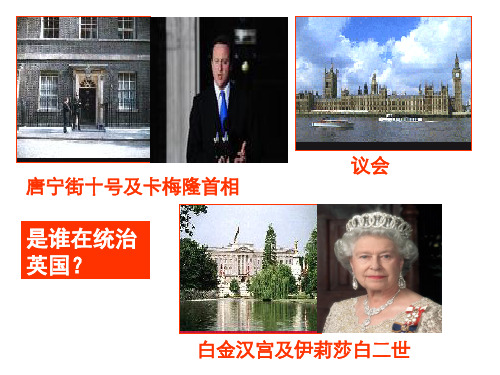
荷兰女王
丹麦女王
西班牙国王夫妇
摩纳哥国王
柬埔寨国王
泰国国王夫妇
是谁在统治德国?
德国宰相俾斯麦
德国皇帝威廉二世
(“一战”的发起者)
德国议会大厦
二、德意志的君主立宪制:
1、确立的前提:德意志的统一:
2、德意志的君主立宪制确立:
标志:1871年《德意志帝国宪法》颁布
1 对丹麦
1864年
3
对法国
2 对奥地利 1866年
1870年
统一后普鲁士“铁血宰相” 俾斯麦当上了帝国宰相
普鲁士国王威廉一 世当上了帝国皇帝
宰相
行政权
皇皇帝帝
“德意志帝国是 由一只大猛兽、 半打狐狸和十几 只耗子组成的 ”
负责
议会 (立法权)
联邦议会
共同组成
帝国议会
下列不能恰当表现德国皇帝和议会的关系的是
“太不象话了,家务活你 连手指也不动一下!”
威廉三世和玛丽 二世
§四、民主制度的作用§
➢1、结束了封建专制制度,促进政治民主化。 ➢2、对社会的稳定作用不可低估。 ➢3、为资本主义发展提供有力保障。 ➢4、是世界上第一个建立君主立宪制的国家,这一制度
的确立和不断完善,为世界上很多国家树立了一种模式。
政治民主 社会稳定 经济发展 一种模式
日本天皇夫妇
英国议会大厦
政治条件:资产阶级革命的成功
(原因、进程)
英过 国程 资 产 阶 级 革 命 曲 线 图
两 次 内 战
处 死 国 王
建 立 共 和 国
苏
威廉三16世49年和玛丽
格 兰
二世
人
1640年
民
起
义
7课英国君主立宪制
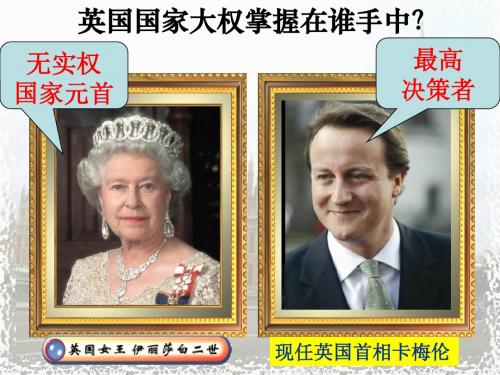
活学活用
每日经济新闻报道:金融危机愈演愈烈,英伦三岛早 已是深陷泥潭。英国财政大臣达林10月8日上午宣布了一 揽子银行救助计划,英国政府将向英国各大商业银行注入 高达500亿英镑 (880亿美元)的资金。甚至准备将中小 银行国有化。你认为: ◆ 内阁成员大体上是赞成还是反对?为什么? 赞同。集体负责,共同进退。 ◆ 女王伊丽莎白二世如果反对,布朗首相会不会为此 改变策略,为什么? 不会。首相掌握行政大权,不对国王负责。 ◆ 如果议会中大多数都极力反对,结果又会如何? 议会可以通过对政府的不信任案,要求内阁下台; 内阁要么下台,要么宣布解散议会,重新选举。
光 荣 革 命 1688年 完 成
革命爆发 1640年
1660年 斯图亚特王朝 复辟 时间
• 1、“它是一场没有流血的戏剧,不具有革命性 质,麦考来的《英国史》称它是”理想的、合法 的、典范的革命“。这场革命的实质是( ) • A 封建政权内部的争夺政权的斗争 • B 资产阶级与封建势力妥协的斗争 • C 资产阶级内部的争夺政权的斗争 • D 封建国王与克伦威尔争夺政权的斗争
英国国家大权掌握在谁手中?
无实权 国家元首 最高 决策者
现任英国首相卡梅伦 前英国首相布朗
第 7 课 英国君主立宪制的建立
Constitutional Monarchy System in England 宪法的
君主立宪制含义:
君主制
国家的一切是由法律来决定的,君主无实权, 而且本身也要遵循法律。
小结
一条主线:英国君主立宪制的确立、发展、完善 过程 两大趋势: 国王权力不断削弱 议会权力不断增强 三个转移:立法权、财政权等从国王转移到议会 (《权利法案》) 行政权从国王手里转移到内阁 (责任内阁制确立) 民主权利转移:议会改革 (贵族民主→工业资产阶级民主→公民民主)
Unit_2_The_Constitutional_Monarchy_英国的君主立宪制
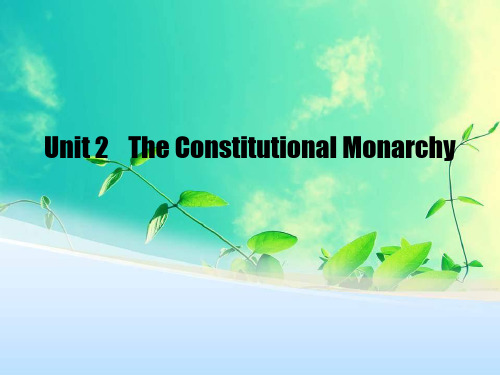
Buckingham Palace
Buckingham Palace, the monarch's principal residence
16
Monument of Queen Victoria
17
Windsor Castle is an official residence of The Queen and the largest occupied castle in the world. William the Conqueror built the castle in 1080 and it has remained a royal palace and fortress for over 900 years.
Queen Elizabeth’s coronation on June 2, 1953
The Royal Family Tree
Charles Prince of Wales
Anne Princess Royal
Andrew Duke of York 约
Edward Earl of Wessex
It is the Queen's official and main royal London home. The Palace has around 600 rooms, including 19 State rooms, 52 royal and guest bedrooms, 78 bathrooms, 92 offices, a cinema and a swimming pool. It also has its own post office and police station.
考点
What is the role of the Monarchy?
why Constitutional monarchy was established in UK
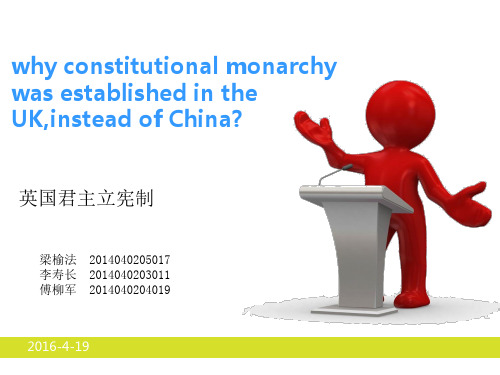
The reasons of British constitutional monarchy 君主立宪制出现的原因
Political traditions
In 1295, Edward II formally established Parliament the contradiction between capitalist economy and absolute monarchy In 1295, Edward II formally established Parliament,which marked the beginning and development of the restrictions on crown's power. Parliament was reserved during the process of British development. Parliament's power has steadily increased while the Crown's has steadily declined,breaking the balanced relationship.It founded the base for The British bourgeois revolution.
the limit of royal power
In 1215,King John was forced to sign the Magna Carta.The Magna Carta aim to limit royal power. In British history,monarchy had been advancing while being constrained,both the king and nobility have certain rights and obligations to maintain a balanced relationship. it was the most significant early influence on the extensive historical process that led to the rule of 6 constitutional law.
必修一第7课 英国君主立宪制的确立

-11-
1《权利法案》颁布的背景时间、目的、主要内容和意义 • 背景:光荣革命后,资产阶级和新贵族掌权 • 时间:1689年 • 目的:限制国王权力,保障议会的权力 • 主要内容: 以明确的法律条文限制国王的权力,保证议会的立 法权、财政权、司法权、军权等权力。 • 意义: ①否定了君权神授,使王权受到法律的严格制约; ②议会权力日益超过国王的权力,国王开始逐渐处 于“统而不治”的地位。 ③标志着君主立宪制的确立。
妥协。
• 意义:确立起资产阶级和新贵族的联合专
政,标志着资产阶级革命的结束;有利于 政局的稳定及资本主义发展;破坏了世袭 继承规则,为限制王权奠定了基础。
-10-
• 英国革命历经近半个世纪,具有曲折性和反 复性,曾经的“共和试验”和王朝复辟都从 不同的侧面证明共和政体和传统的君主专制 均不适合英国,对传统君主制进行改造势在 必行;光荣革命的光荣之处就在于,它是一 次不流血的政变,是一次政治改良,他用最 小的代价实现了英国重大的社会变革,是近 代英国历史发展的分水岭。
-7 -
光 荣 革 1688年 命
时间
1688年
-8 -
多角度归纳认识“光荣革命”的原因、实质及意 义
• 原因:
• 根本原因:封建专制统治阻碍了资本主义 的发展,资产阶级和新贵族要求废除封建 制度,发展资ቤተ መጻሕፍቲ ባይዱ主义; • 主要原因:复辟王朝的施政措施损坏了资 产阶级和新贵族的既得利益。
-9 -
• 实质:是资产阶级、新贵族同封建势力的
立法权 征税权
司法权 • 设立审理宗教事务之钦差法庭之指令,以及 一切其他同类指令与法庭,皆为非法而有害。
• 除经议会同意外,平时在本王国内征募或维 持常备军,皆属违法。
consitutional monarchy 君主立宪制论文

AbstractConstitutional monarchy, also known as parliamentary monarchy, is a governmental form in which Parliament exercises the supreme power. However, the monarch, as head of state, is only a symbol of authority. Britain is a typical representative of this governmental form. In this paper, firstly it explains the concept of constitutional monarchy, and then comes the history and reasons of Britain constitutional monarchy, then gives brief introductions of constitutional monarchy that once existed or still exists in other countries, namely France, Japan and China. Finally it talks about the influence of constitutional monarchy. From the historical review of constitutional monarchy, it is helpful to develop a systemic and deeper understanding of constitutional monarchy.Key words: Constitutional monarchy, Parliament, Britain, Power, DevelopmentHistorical review of Constitutional MonarchyI IntroductionConstitutional Monarchy has had a history of more than 300 years. Firstly established in Britain, it has been continuously perfecting itself afterwards. In the governmental system, Parliament has a stronger power than Crown. As such a crucial political structure, how did it come into being? When did it start? What does it really mean?How does it work on the whole world? Here the paper will have specific illustrations.II Body1.The Concept of Constitutional MonarchyConstitutional monarchy is a form of government in which a monarch acts as head of state within the parameters of a written, unwritten or blended constitution. It differs from absolute monarchy in that an absolute monarch serves as the sole source of political power in the state and is not legally bound by any constitution.Most constitutional monarchies employ a parliamentary system in which the Monarch may have strictly Ceremonial duties or may have Reserve Powers, depending on the constitution, have a directly or indirectly elected prime minister who is the head of government and exercises effective political power.In the past, constitutional monarchs have co-existed with fascist and quasi-fascist constitutions and with military dictatorships. Contemporary constitutional monarchies include Australia, Canada, Japan, Norway, Spain, andUnited Kingdom and so on.2.The History of British Constitutional MonarchyBritain is the democratic cradle of western politics in modern world. As the earliest constitutional mode in the world, British parliamentary constitutional monarchy has great impact in the world. Therefore, it is indispensable to havea brief view of British constitutional monarchy. Here are two instrumentalevents in the history of British constitutional monarchy.2.1The Great Charter of LibertyThe Great Charter of Liberty was originally issued on June 15, 1215, which required king John of England to proclaim certain rights, respect certain legal procedures, and accept that his rights will be bound by the law.The Great Charter of Liberty had a significant influence on the historical process in some English speaking countries. It influenced the development of most famous documents, such as the United States Constitution.The Great Charter of Liberty was a document that firstly forced an English king in an attempt to limit his power as well as protect the barons’privileges. King Henry I was the first monarch who voluntarily stated that his power was under the law.2.2 Glorious RevolutionThe glorious revolution, which was also famous as the war of English succession bloodless revolution, was the overthrow of King James II of England. In 1688, a union of parliamentarians and the Dutch stadtholder William II led an army to invade England, and the throne was ascended as William III of England. After the revolution, modern British parliamentary democracy commenced, never since has the monarch held absolute power, and the Bill of Rights has become one of the most important document in the political history of Britain. Since 1689, government under a system of constitutional monarchy in England, and later the United Kingdom, has been uninterrupted. Since then, Parliament’s power has steadily increased while the Crown’s has steadily declined.3.The Reasons of British Constitutional MonarchyIn the long-time development of civilization, eventually England employed constitutional monarchy as its political system, which was totally suited to national conditions and promoted the economic development of British capitalism. Its constitutional mode of representative governmental system combined with the political culture and historical tradition of the country constitutes the parliamentary kaleidoscope of democratic politics of the world today. Through many historians and politicians’analysis, it has been figured out that political tradition and national psychology are two reasons of the system. .3.1Political traditionsIn British history, monarchy had been advancing while being constrained,that is to say, both the king and nobility have certain rights and obligations to maintain a balanced relationship. In 1925, Edward II formally established Parliament, which marked the beginning and development of the restrictions on crown’s power. This tradition was reserved during the process of British development. Parliament’s power has steadily increased while the Crown’s has steadily declined, breaking the balanced relationship now and then. Every time when it was recovered, Parliament’s power has a shade increased once more. Apparently it can be proved that British monarchy has a centuries-long evolutionary process, ultimately established after the British bourgeois revolution, rather than the product of bourgeois overnight.3.2 National psychologyThe English Nation is a stable and legalistic people. In the long course of historical development, they formed legal tradition and the idea of loyalty.Among different classes in Britain, they all held full respect to their majesty.They owed much to the king for the boost of social and economic development. In a sense, King was an idol of the whole nation for protecting people’s freedom and property. For example, Charles II was welcomed when he returned with a promise that “respecting P arliament”; on the contrary, feeling of relaxation filled the whole country after Cromwell’s death. The former one was under Parliament while the latter was not. That is why the English nation supports King.The establishment of parliamentary system is aiming to adapt to the capitalist socio-economic development and the need for political democratization, likewise the reservation of monarchy was determined by considering the British tradition and the objective reality. Therefore, constitutional monarchy was the best choice made by bourgeois and nobility under the historical conditions.4.Constitutional Monarchy in Other Nations4.1FranceIn French history, constitutional monarchy temporarily appeared in the July Dynasty. It was established by great bourgeois during the French July Revolution of 1830, which was the final and highest phase of the constitutional monarchy in France. The natural hostilities between great bourgeois and landed aristocracy determined the inexorable trend for the July dynasty to replace the Bourbon Court, while the French constitutional problems and the limits of French great bourgeois made the constitutional monarchy in an inevitable dilemma.4.2JapanIn the later half of 19th century, Japan was experiencing a renewal of itself.The famous Meiji Restoration was a chain of events that led to enormous changes in Japan’s social and political structure. Thereafter Japan became a country of constitutional monarchy. But the constitutional monarchy in Japan was not the same as in Britain. The tenno in Japan holds more power than thequeen in Britain.4.3ChinaIn China, constitutional monarchy has never existed. However, once there was a group of bourgeois trying to establish it, hence the One Hundred Days Restoration came up. Unfortunately it merely lasted one hundred days. When probing into the reason, feudalism was the instrumental point of the failure. It showed that China had no foundation of capitalism and constitutional monarchy. Though it failed, the ideology of constitutional monarchy did havea huge impact in China’s society at that time.5.The Influence of Constitutional MonarchyBritain, as the head of leading to develop capitalism, has suffered from a long and tortuous history in order to create the very political structure, which serves for the survival and development of capitalism. Eventually British chose the constitutional monarchy which has proved itself a propellant in British history. It cannot be denied that constitutional monarchy did work on the British development, and that it has a positive influence on the international society.However, some historians have been argued that British revolution has the deficiencies of conservativeness and concession. It made a concession to the feudalism with conserving the monarch. Admittedly, it is a question open to dispute. Nevertheless, when contemplating this question, it is better to take the historical conditions into consideration. Constitutional monarchy was the best possible form at that time, and later it has had a significant and far-reaching influence among most western countries. They were following the example of Britain which so far 13 countries of Northern and Western Europe in all are under constitutional monarchy.III ConclusionConstitutional monarchy is a pretty important political structure in the Europe. During its 300-year history of development, it has been generated an enormous impact in the political system of the European countries, expanding to the world. British constitutional monarchy, as the earliest constitutional mode in the world, plays the bellwether in exploring the road of representative governmental system. From the analysis above, it is more straightforward to havea deeper understanding of the constitutional monarchy.IV References[1]曹娟,英日两国君主立宪制的区别,理解教材,12[2]陈利金,近代英国君主立宪制的局限性,广西师范大学学报[J],1990(8),76-83[3]来安方,《英美概况》,郑州:河南人民出版社,2004.[4]李其荣,从英国君主立宪制的确立看英国资产阶级革命的保守性,80-81[5]刘杰,论英国宪政模式的世界影响,历史教学[J],2006(2),32-35[6]尚待贵,维新派君主立宪思想的反思,法治纵论[J],249-262[7]沈尊华,英国确立君主立宪制原因初探,安徽教育学院学报[J],1997(3),27-28.[8]谢天冰,英国君主立宪制及其历史渊源,福建师范大学学报[J],1989(2),93-99[9]许金华,论法国七月王朝君主立宪制的建立,史学月刊[J],2001(4),86-90[10]王宇博,君主立宪制:英国的历史选择,60-64[11]汪效驷,论君主立宪制在英国的建立及影响,淮北煤师院学报[J],2001(5),42-51[12]赵丽霞,漫谈英国君主立宪制的历史成因,休闲驿站[J],37。
英语国家概况英国的政府体制

英语国家概况英国的政府体制看英国的征服体制,了解这个国家的概况情况。
下面是店铺带来英国的政府体制相关介绍,欢迎大家阅读!英语国家概况:英国的政府体制介绍Government and Administration英国政府机构I.General knowledgeThe United Kingdom is a constitutional monarchy,the head of state is a king or a queen. The UnitedKingdom is governed, in the name of the Sovereignby His or Her Majesty's Government. The System ofparliamentary government is not based on a writtenconstitution, the British constitution is not set out in any single document. It is made up ofstatute law, common law and conventions. The Judiciary determines common law andinterprets statutes.联合王国是君主立宪制国家,国家的首脑是国王或女王。
联合王国以君的名义,由国王或女王陛下政府治理。
英国的议会制度并不是基于成文宪法,英国宪法不由单一文件构成,而由成文法,习惯法和惯例组成。
司法部门裁定习惯法或解释成文法。
英语国家概况:英国的政府体制(君主立宪制)Constitutional monarchy 君主立宪制The British monarchy is known as constitutional monarchy. It means the monarchy's powerare limited by law and Parliament. The monarchy actually has no ral power. Constitutionalmonarchy began after the Glorious Revolution in 1688.英国的君主体制是以君主立宪闻名的。
英语介绍英国君主立宪制的作文
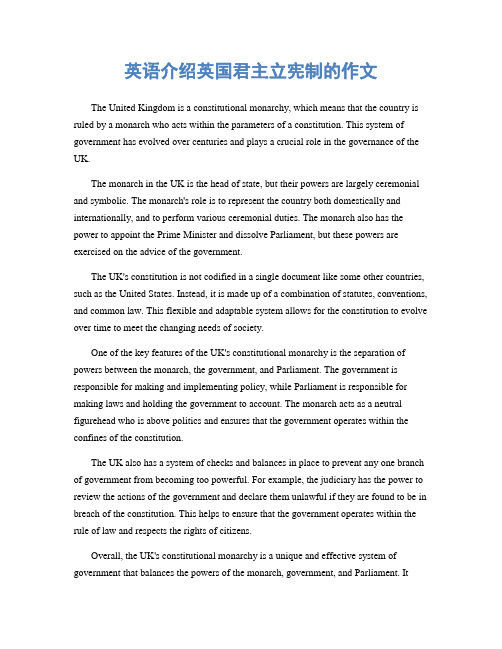
英语介绍英国君主立宪制的作文The United Kingdom is a constitutional monarchy, which means that the country is ruled by a monarch who acts within the parameters of a constitution. This system of government has evolved over centuries and plays a crucial role in the governance of the UK.The monarch in the UK is the head of state, but their powers are largely ceremonial and symbolic. The monarch's role is to represent the country both domestically and internationally, and to perform various ceremonial duties. The monarch also has the power to appoint the Prime Minister and dissolve Parliament, but these powers are exercised on the advice of the government.The UK's constitution is not codified in a single document like some other countries, such as the United States. Instead, it is made up of a combination of statutes, conventions, and common law. This flexible and adaptable system allows for the constitution to evolve over time to meet the changing needs of society.One of the key features of the UK's constitutional monarchy is the separation of powers between the monarch, the government, and Parliament. The government is responsible for making and implementing policy, while Parliament is responsible for making laws and holding the government to account. The monarch acts as a neutral figurehead who is above politics and ensures that the government operates within the confines of the constitution.The UK also has a system of checks and balances in place to prevent any one branch of government from becoming too powerful. For example, the judiciary has the power to review the actions of the government and declare them unlawful if they are found to be in breach of the constitution. This helps to ensure that the government operates within the rule of law and respects the rights of citizens.Overall, the UK's constitutional monarchy is a unique and effective system of government that balances the powers of the monarch, government, and Parliament. Itprovides stability, continuity, and accountability in governance, while also allowing for flexibility and evolution to meet the needs of a modern society. The UK's constitutional monarchy has stood the test of time and continues to be a model for other countries around the world.。
英国政治体制君主立宪制英文介绍
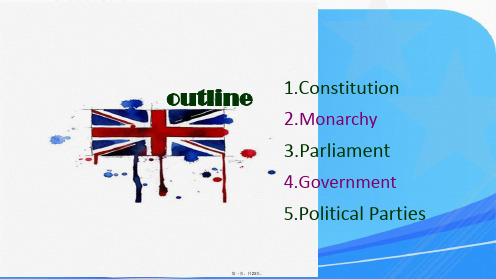
position : About 1,100 hereditary and life peers
2.The speaker : Appionted by the sovereign on advice of Prime Minister
3.The qualification:
1.The Lords Spiritual (神职贵族)
就只好站在议事厅的入口处,继续 参与会议。
Frontbencher Backbencher scepter
第十二页,共23页。
4.British Government
Prime Minister Ministers (Heads of all important departments) Treasury 财政部 Ministry of Defense 国防
毕业院校:? 伊顿公学、牛津大学 国籍: 大不列颠及北爱尔兰联合王国 (the United Kingdom)
职业: 英国首相 信仰:英国国教 (Anglicanism)( The Church of England understands itself to be
both Catholic and Reformed).
1.Wins the majority of seats in the House of Commons
2.Head of the government 3. Leader of his party
4.He has the right to select his cabinet, hand out departmental positions, decide the agenda(议事日程) for cabinet meetings which he also chairs.
英国君主立宪制--British Constitutional Monarchy
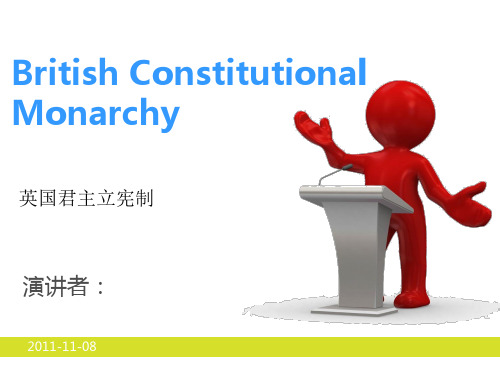
政党制度的演变
Whigs
the liberal party the labour party
Article6
except for the parliament 's permission,any other activities Military power of enlistment or maintaining a standing army, all belong to illegal.
Establishment of democracy 建立民主
《 Bill of right 》《权利法案》
The expansion of the right to be voted as the parliament representative
Complement of democracy 完善民主
election
The parliament ( legislative power )
The upper House
( judicial power )
people
11
Complement of democracy 完善民主
01
The expansion of the right to be voted as the parliament representative议会选举权的扩大 The evolution of party system 政党制度的演变 The formation of responsibility cabinet system 责任内阁制的形成
英语国家概况英国的政府体制

英语国家概况英国的政府体制看英国的征服体制,了解这个国家的概况情况。
下面是店铺带来英国的政府体制相关介绍,欢迎大家阅读!英语国家概况:英国的政府体制介绍Government and Administration英国政府机构I.General knowledgeThe United Kingdom is a constitutional monarchy,the head of state is a king or a queen. The UnitedKingdom is governed, in the name of the Sovereignby His or Her Majesty's Government. The System ofparliamentary government is not based on a writtenconstitution, the British constitution is not set out in any single document. It is made up ofstatute law, common law and conventions. The Judiciary determines common law andinterprets statutes.联合王国是君主立宪制国家,国家的首脑是国王或女王。
联合王国以君的名义,由国王或女王陛下政府治理。
英国的议会制度并不是基于成文宪法,英国宪法不由单一文件构成,而由成文法,习惯法和惯例组成。
司法部门裁定习惯法或解释成文法。
英语国家概况:英国的政府体制(君主立宪制)Constitutional monarchy 君主立宪制The British monarchy is known as constitutional monarchy. It means the monarchy's powerare limited by law and Parliament. The monarchy actually has no ral power. Constitutionalmonarchy began after the Glorious Revolution in 1688.英国的君主体制是以君主立宪闻名的。
Constitutional Monarchy君主立宪制
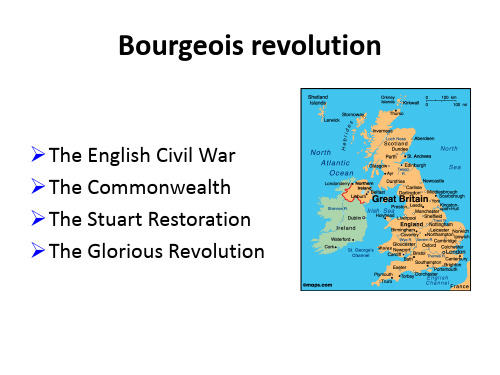
The Oliver Cromwell
Roundheads led by Oliver Cromwell (1599-1658) Cromwell’s New Model Army defeated forces of Charles I, who was put on trial and executed in 1649 Cromwell created the English Commonwealth but soon disbanded Parliament and ruled England as a dictator
The Stuart Restoration
After the death of Oliver Cromwell, Parliament recalled the Stuart dynasty Charles II (1660-1685) James II (1685-1688) was a Roman Catholic but had 2 Protestant daughters:
Bourgeois revolution
The English Civil War The Commonwealth The Stuart Restoration The Glorious Revolution
Social background of
• Time:in the 17th century
Charlie I (Charles Ⅰ, November 19, 1600 - January 30, 1649), England, Scotland and the king of Ireland, the only one in history was publicly executed king. • Charlie I was the second son of James I and princess Anne of Denmark , was thin, and his father is from Scotland Presbyterian teacher, proficient in Latin and Greek. His brother died at the age of 18, he became the prince Welsh. He was fascinated by the Spanish princess, but at that time the British had converted to Anglicanism (Protestant), and the thirty years war in Europe support among Protestant Party (including Charlie's sister, brother-in-law PFALZ ( King Frederick V and Queen), and Catholic Spain (Catholicism)shoul d the enemy.
英国君主立宪制
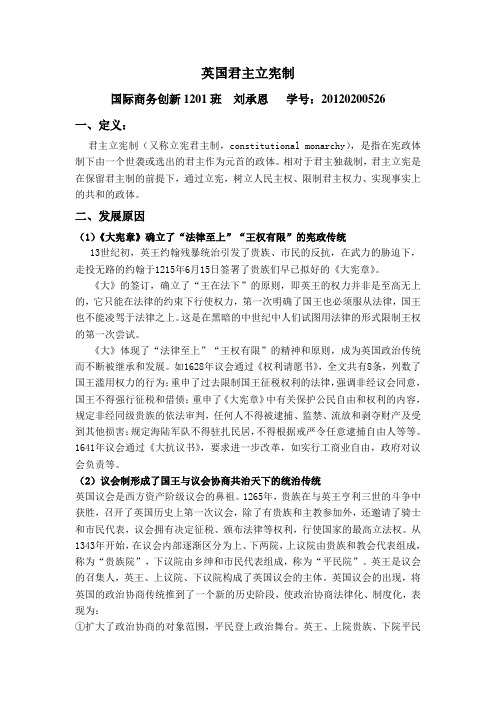
英国君主立宪制国际商务创新1201班刘承恩学号:20120200526一、定义:君主立宪制(又称立宪君主制,constitutional monarchy),是指在宪政体制下由一个世袭或选出的君主作为元首的政体。
相对于君主独裁制,君主立宪是在保留君主制的前提下,通过立宪,树立人民主权、限制君主权力、实现事实上的共和的政体。
二、发展原因(1)《大宪章》确立了“法律至上”“王权有限”的宪政传统13世纪初,英王约翰残暴统治引发了贵族、市民的反抗,在武力的胁迫下,走投无路的约翰于1215年6月15日签署了贵族们早已拟好的《大宪章》。
《大》的签订,确立了“王在法下”的原则,即英王的权力并非是至高无上的,它只能在法律的约束下行使权力,第一次明确了国王也必须服从法律,国王也不能凌驾于法律之上。
这是在黑暗的中世纪中人们试图用法律的形式限制王权的第一次尝试。
《大》体现了“法律至上”“王权有限”的精神和原则,成为英国政治传统而不断被继承和发展。
如1628年议会通过《权利请愿书》,全文共有8条,列数了国王滥用权力的行为;重申了过去限制国王征税权利的法律,强调非经议会同意,国王不得强行征税和借债;重申了《大宪章》中有关保护公民自由和权利的内容,规定非经同级贵族的依法审判,任何人不得被逮捕、监禁、流放和剥夺财产及受到其他损害;规定海陆军队不得驻扎民居,不得根据戒严令任意逮捕自由人等等。
1641年议会通过《大抗议书》,要求进一步改革,如实行工商业自由,政府对议会负责等。
(2)议会制形成了国王与议会协商共治天下的统治传统英国议会是西方资产阶级议会的鼻祖。
1265年,贵族在与英王亨利三世的斗争中获胜,召开了英国历史上第一次议会,除了有贵族和主教参加外,还邀请了骑士和市民代表,议会拥有决定征税、颁布法律等权利,行使国家的最高立法权。
从1343年开始,在议会内部逐渐区分为上、下两院,上议院由贵族和教会代表组成,称为“贵族院”,下议院由乡绅和市民代表组成,称为“平民院”。
西班牙是不是君主立宪制

西班牙是不是君主立宪制
1、西班牙是君主立宪制的国家。
2、西班牙现行宪法于1978年12月6日全国公民投票通过,同年12月29日生效。
宪法规定西班牙是社会与民主的法制国家,实行君主立宪制,议会民主制,王位由胡安·卡洛斯一世的直系后代世袭。
最高元首(国王)为国家元首和武装部队最高统帅,代表国家。
政府负责治理国家并向议会报告工作。
宪法承认并保证各民族地区的自治权。
西班牙议会由参议院和众议院组成,行使立法权,审批财政预算,监督政府工作。
立法权以众议院为主,参议院为地区代表院。
议员由普选产生,任期4年。
3、君主立宪制(又称立宪君主制,constitutional monarchy),是相对于君主独裁制的一种国家体制。
君主立宪是在保留君主制的前提下,通过立宪,树立人民主权,限制君主权力、实现事实上的共和政体。
君主立宪制限制了古代的帝王独裁,变成了“王在议会,王在法下。
”的主流观点。
在宪政体制下由一个世袭或选出的君主作为元首的政体。
经济基础:17世纪,英国资本主义发展。
限制王权的传统。
广义上的君主立宪制分为议会制君主立宪制和二元制君主立宪制(这个更常被称为立宪君主制)君主立宪制的特点是国家元首是一位君主(皇帝、国王、大公等等,教皇有时也被看做是一个君主)。
英国君主立宪制的建立

(1)重新分配议席:取消许多已经衰败的选区, 减少一些选区的议席;人口增加的郡的议席增多, 新兴工业城市取得较多议席。具体规定:人口不 足2000人的56个城市被取消了下院议席,人口在 2000~4000人之间的31个城市只能保留一个议席。 空余下来的席位给予人口增多的郡和新兴工业城 市,新兴工业城市得到65个席位。
威廉和玛丽加冕典礼
二、议会权力的确立与发展 1、议会权力的确立——《权利法案》的颁布:
时间: 1689年 目的: 为了限制国王的权利。
颁布机构:英国议会 内容: 以明确的法律条文,限制国王权利,保证议会 的种种权力,法律意志开始取代专制王权。 意义:
①为限制王权提供了法律保障。(国王统而不治) ②英国建立起君主立宪制的资产阶级专政。
《权利法案》的内容
• 除经议会同意外,平时在本王国内 征募或维持常备军,皆属违法。 军事权 选举权 言论权
• 议会议员之选举应是自由的。
• 议会内之演说自由、辩论或议事之 自由,不应在议会以外之任何法院 或任何地方,受到弹劾或询问。
王在议会 王在法下
(国王统而不治)
(法律至高无上)
• 为申雪一切诉冤,并为修正,加强 与维护法律起见,议会应时常集会。
——《社会科学大辞典》p376
二元制君主立宪制:议会和行政机关 (政府)分掌政权,政府由国家元首控制 而不对议会负责。(近代德国)
——《社会科学大辞典》p404
一、英国资产阶级革命
1、背景:
英国资本主义的快速发展(经济与阶级)。
斯图亚特王朝的封建专制统治严重阻碍了 资本主义制王权的主张。
(2)更改选举资格,扩大选民范围:降低选民的 财产和身份要求,工业资产阶级和农村中的富裕 农民得到选举权,选民人数大大增加。到1832年 英国大约有16%的成年男子得到选举权。
- 1、下载文档前请自行甄别文档内容的完整性,平台不提供额外的编辑、内容补充、找答案等附加服务。
- 2、"仅部分预览"的文档,不可在线预览部分如存在完整性等问题,可反馈申请退款(可完整预览的文档不适用该条件!)。
- 3、如文档侵犯您的权益,请联系客服反馈,我们会尽快为您处理(人工客服工作时间:9:00-18:30)。
Constitutional Monarchy in England • The history background
• The glorious revolution of 1688, overthrew the autocratic rule of the feudal restoration dynasty. • The proclamation of the English Bill of Rights.
Mary married to Dutch Protestant William of Orange Anne married to Protestant Prince of Denmark
The Glorious Revolution of 1688
After the birth of a Catholic son (who would inherit the throne), James II fled England for France Parliament invited his daughter Mary and her husband William to rule England as joint sovereigns Laws were passed to ensure a Protestant succession
The English Bill of Rights
• Time : in 1689 • Purpose : limit the power of the king ensure the rights of the people. • Influence : provide legal guarantee for the limitation of kingship; the establishment of parliamentary monarchy powerful than the kingship, and gradually established a constitutional monarchy of the bourgeois revolution
Bourgeois revolution
The English Civil War The Commonwealth The Stuart Restoration The Glorious Revolution
Social background of
• Time:in the 17th century
Charlie I (Charles Ⅰ, November 19, 1600 - January 30, 1649), England, Scotland and the king of Ireland, the only one in history was publicly executed king. • Charlie I was the second son of James I and princess Anne of Denmark , was thin, and his father is from Scotland Presbyterian teacher, proficient in Latin and Greek. His brother died at the age of 18, he became the prince Welsh. He was fascinated by the Spanish princess, but at that time the British had converted to Anglicanism (Protestant), and the thirty years war in Europe support among Protestant Party (including Charlie's sister, brother-in-law PFALZ ( King Frederick V and Queen), and Catholic Spain (Catholicism)shoul d the enemy.
Content :
Affirmed Parliament’s right to make laws and levy taxes Made it impossible for kings to rule without Parliament Parliament’s consent was necessary to raise an army The rights of citizens to petition the monarch, keep arms, have a jury trial, and not to be burdened with excessive bail were guaranteed The Bill of Rights created a system of government based on the rule of law and a freely elected Parliament, laying the foundation for constitutional monarchy By deposing one monarch (James II) and establishing another (William and Mary), Parliament destroyed the divine-right theory of kingship and confirmed its right to participate in government along side of the king
Charles I (16y without Parliament Personal Rule from 1629 to 1640 Charles’ attempts to impose the Church of England in Scotland caused War Puritans joined the Scottish rebels in the English Civil War
In 1660, Charlie S succeeded to the throne, he will be Karen will’s body from the dug out to London 's out to London's Westminster Abbey and his body symbolic were hanged, in 1658 also will be bound on the post show to the public. It is reported, Cromwell's head was repeated until the 1960 sale, finally find a place to bury was buried in Cambridge's Sussex College underground. The church has an unusual plaque, saying: "the UK, Scotland and Northern Ireland the Lord Protector, the University from1616 to1617 were alumni, Oliver Cromwell, was buried here in March 25, 1960." It is reported, the remaining mask Cromwell was placed in the Warrick castle and the Museum of London.
James I (1603-1625)
Elizabeth’s successor was the Scottish King James VI, who became James I of England James I and his son, Charles were absolutists and hated the English tradition of ruling with the consent of Parliament. A strong believer in the divine right of kings, James I felt he was answerable to no one save God. James I expected to rule with minimal involvement of Parliament, which had grown accustomed to be consulted in important matters of state. James I inherited a large royal debt so he needed Parliament to vote new taxes & to fund wars against England’s enemies Despite pressures from both Catholics and Presbyterian Protestants, James I maintained the Church of England
The Oliver Cromwell
Roundheads led by Oliver Cromwell (1599-1658) Cromwell’s New Model Army defeated forces of Charles I, who was put on trial and executed in 1649 Cromwell created the English Commonwealth but soon disbanded Parliament and ruled England as a dictator
